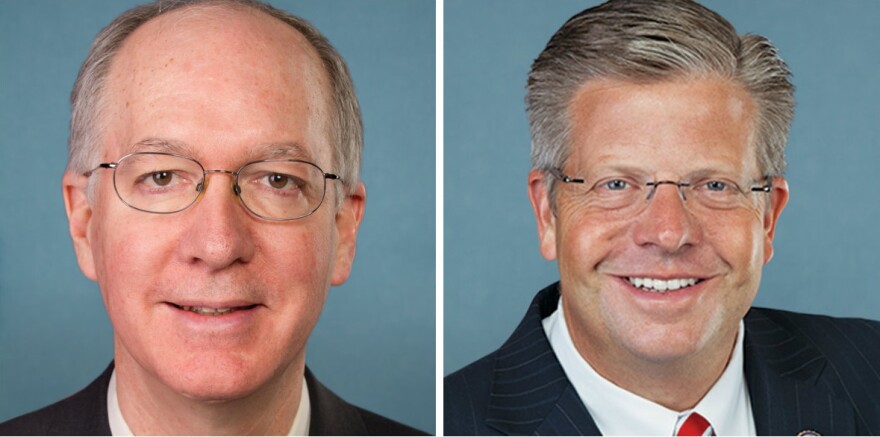On A Friday Forum earlier this year, Illinois U.S. Representatives Bill Foster and Randy Hultgren talked about their hopes and concerns for the new Congress as it began its work. For this week's Friday Forum, WNIJ's Guy Stephens asked the two for an update on how things are going in Congress.

Randy Hultgren and Bill Foster have both served several terms in the U.S. House. Hultgren, a Republican considered one of the most conservative members of Congress, took the old 14th District from Foster in 2010. When new lines were drawn in 2012, Hultgren won election in the new 14th, while Foster, who calls himself a centrist Democrat, won the seat in the new 11th District. Both won re-election last year.
It’s been a tumultuous several months in Washington, but Hultgren felt that Congress, at least, has earned a fairly good grade. He gave it a B. Why?
"There’s some really good things happening," he said, but it could be better -- with some help.
"We need to be doing our work, certainly, in the House, but also need the Senate to step up and do some of the important things. They’ve been very focused early on in this session on appointments and I know that took a lot of time.”
Hultgren based his positive assessment, in part, on Congress’s productivity. Just look at the numbers through this week, he said. There’s more going on than you’d guess from the headlines. He finds that encouraging.
“We’ve passed 158 bills through the House, and that’s the highest, really, in recent history," he said. "The average at this point would be right around a little over 91 bills, and 37 of them have actually gone on to become law, through the Senate and signed by the President. So in spite of all of the busy-ness and noise and challenges and bumps, we’re still getting our work done. We’re still moving forward on some important issues.”
But Hultgren said he thinks there is a limited window of opportunity to pursue those big issues, and the challenge is for the White House and Congress to stay focused. Otherwise, the people may give his party a much lower grade than his in the 2018 elections.
Foster had a very different view. He didn’t disagree that a lot has been done. Whether that’s a positive, he said, it depends.
“Well," he said,"you’d have different grades in different subjects. For instance, in health care, I would give Congress a D-.”
Foster said that’s because he thinks Republicans should have gone in another direction than they did with the GOP health care bill, which he said was often referred to during the debate by opponents as a "wealthcare bill."
"The starting point and the ending point of that was a tax cut for the wealthy of most of a trillion dollars," he said. "And when that’s your starting point, you then have to balance the books. You have to take away most of a trillion dollars of healthcare from someone in the United States.”
Foster said likewise, the effort to repeal and replace the financial reform legislation known as Dodd-Frank, which passed on a party-line vote, has provisions that could have dire consequences for both individuals and the economy.
Foster said those concerns also apply to proposals on tax reform and infrastructure spending, which he says have so far been disappointing, but where there remains the possibility of bipartisan action.
Hultgren emphasized that most of the issues and bills that he and his colleagues are working on aren’t the big polarizing ones like health care or tax reform. But they’re still important. He listed his service on the financial services committee, as co-chairman of the Tom Lantos Human Rights Commission that deals with problems such as religious persecution and human trafficking, work on improving access to Perkins Loans that provide individuals money for education, a bill to protect veterans whose credit has been adversely affected by reimbursement delays when using the Veterans Choice Program, and work to strengthen the Federal Home Loan Bank.
Hultgren said those efforts are often -- in fact, mostly -- bipartisan. Foster, too, said it has been possible to work across the aisle on some things. One he pointed to that’s transcended party politics is the opioid crisis. He said the problem is widespread and has, on average, affected Republican districts harder than Democratic ones.
"It’s something where, if you’re going to do some good, you have to spend money," he said. "And so, even people who believe they were elected to cut the size of government are often willing to spend some amount of taxpayer money on things like dealing with the heroin epidemic.”
Foster said that was evident in the bipartisan pushback that reversed proposed cuts to addiction programs in the administration’s preliminary budget.
He said progress also can happen on things that don’t seem so dire – in fact, maybe just the opposite.
“I’ve often found it’s easier to get bipartisan agreement when you’re talking about the long-distant future," he said."If you’re talking about next year’s budget, it immediately gets very partisan."
He cites as an example human genetic engineering -- think designer babies --which seems the stuff of science fiction, but which Foster said is closer to being a reality than you think. He was able to get the chairman of his committee, a Republican with whom he says he rarely agrees, to arrange a hearing on the topic.
Although he’s in the majority, Hultgren said he too realizes that getting a bill not just through the House but the Senate as well and signed into law means reaching out to the other side. He said he often strives to do so, even as he tries to move quickly on his own and his party’s agenda.
But Foster remains concerned about how that process happens in the House these days. He said he’d like to return to how things used to work in Congress -- what’s known as “regular order.” He explained by giving as an example what used to happen to an appropriations bill.
“It would come up under what’s called an open rule, where any member of Congress would get to propose an amendment," he said. "We couldn’t just arbitrarily add large amounts of money to a program, but we could, for example, move money from one bucket to another bucket within the same bill."
This, Foster said, was a very positive way for members of both parties to get involved in coming to a better place, and he thought it was a very healthy thing for the institution.
"But," he said, "it is not loved by those who are in charge of the U.S. House. They want -- them and their staff -- to write just write all the final deals.”
As a result, he said, members of Congress often are asked only for an up-or-down vote on big omnibus bills put before them.
On top of that, Foster said the turmoil -- as well as the policies -- of the Trump Administration has him worried and complicates efforts in Congress to do something constructive for the country. But he said he’ll continue to do his bit to affect change for the better.
Hultgren doesn’t necessarily disagree about the effects of the turmoil on the process. Still, he said, in spite of that, he reminds people once again that it’s not all partisan battling and stalemate in Washington.
“I would say eighty percent of the things we work on or more are absolutely bipartisan things," he said. "So, we’ll continue to get things done and continue to struggle and find ways to get things done on the other twenty percent or so that we absolutely do disagree on.”
But he thinks that, for more of that to happen, both representatives – including him -- and their constituents need to work harder at being well-informed, to recognize other points of view, and not take every bit of information that comes their way from a particular source as gospel truth.
“To listen to not just Fox News, but to tune in to MSNBC once in a while, or CNN, or vice versa," he said. "Or to still get a newspaper and look through that, or if you can get some different websites where you can get some information."
He adds that public radio continues to be a great place to hear a range of perspectives and for going a little bit more in depth on issues than, say, the cable news shows.
If everyone did that, he said, then the system – and Congress – would have a better chance to work more like it should.



